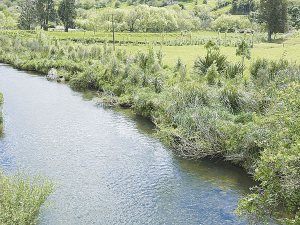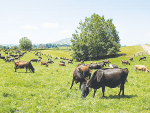Spring has sprung and with it comes an increased risk of nutrients leaving farms due to high rainfall, low pasture growth, lots of stock urine being deposited, soil compaction and pugging.
That has the potential to impact farm production and damage the health of waterways and groundwater.
Handling those risks smartly, thereby boosting production while protecting fresh water, is what good nutrient management is all about.
Good nutrient management will keep nutrients cycling within the farm system and reduce losses to the environment to the bare minimum.
Some nutrients are more prone to loss than others, depending on the nature of the nutrient, soil type and climatic conditions.
Leaching through the soil - one of the biggest nutrient loss risks - can see the loss of the likes of nitrogen, potassium, calcium, magnesium and sulphur.
It occurs when water washes soluble nutrients through the root zone into deeper layers of the soil and they become inaccessible to plant roots. The leaching risk depends on various factors such as soil type, total rainfall, extreme weather events and the actual quantity of soluble nutrients present in the soil.
Don't oversupply the soil with such types of soluble nutrients, especially not during winter and early spring, as there is a very high risk of these getting washed out through the soil and lost from farm systems.
A good understanding of the processes and terminology involved with nutrient cycles is important for budgeting and management.
For nitrogen, one of the key nutrients that both grows grass and can harm waterways, there are two important processes - immobilisation and its opposite, mineralisation.
Immobilisation is the conversion of plant available nitrogen into organic forms.
Mineralisation is the conversion of soil organic nitrogen into plant available forms such as nitrate and ammonium.
These processes are controlled by microbes, and the degree of their activity, in the soil.
Another point about nitrogen is that, generally, there will be an increase in nitrate leaching with increasing rates of nitrogenous fertiliser.
Phosphorus loss, on the other hand, mainly occurs from erosion and runoff. Research has revealed that phosphorus losses will be high in soils with high Olsen-P levels, and also on steep to rolling country. Managing these optimum levels and controlling soil erosion are keys to helping prevent this.
Overall, the ongoing challenge is to ensure our farming systems efficiently cycle nutrients. Smart nutrient management practices for all land uses and activities has the potential to bring about substantial improvements in the quality of our water resources and profits.
From now, no more than 190 kilograms per hectare per year (kg/ha/yr) of synthetic nitrogen may be spread on land that is grazed, including pasture and any grazed crops.
Farmers need to plan the annual use of synthetic nitrogen fertilise to stay within the cap. Regional council permission is required to exceed the cap.
Waikato Regional Council is working with stakeholders to help farmers adopt good practices and supports the use of industry-developed codes of practice, particularly the Code of Practice for Nutrient Management, Fertmark and Spreadmark.
Bala Tikkisetty is a sustainable agriculture advisor technical at Waikato Regional Council. He can be contacted by calling 0800 800 401 or emailing This email address is being protected from spambots. You need JavaScript enabled to view it..


















